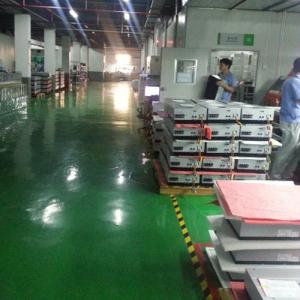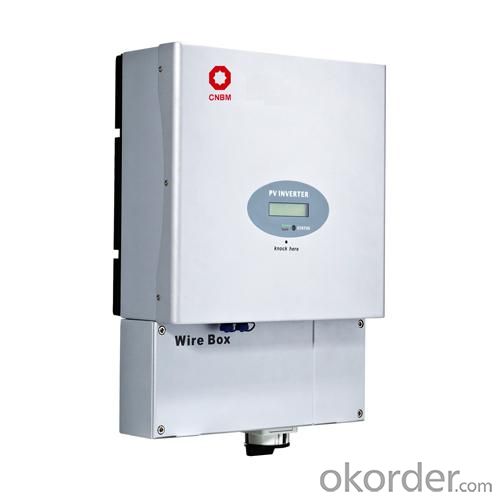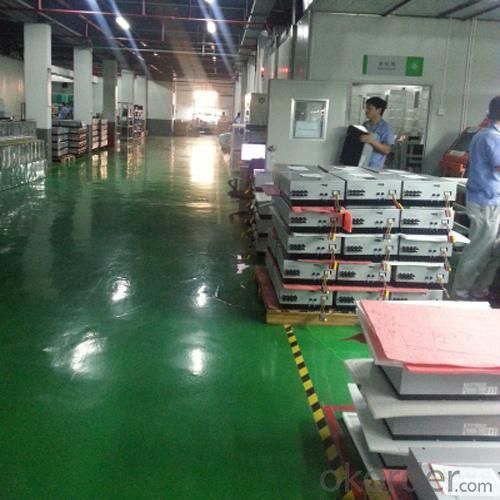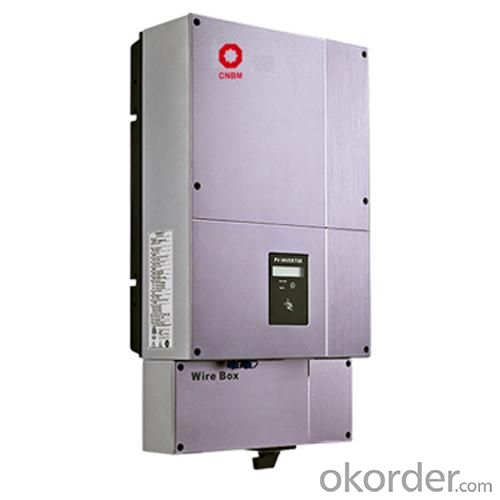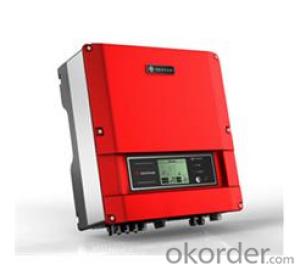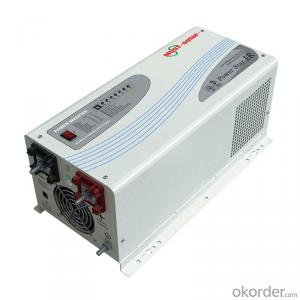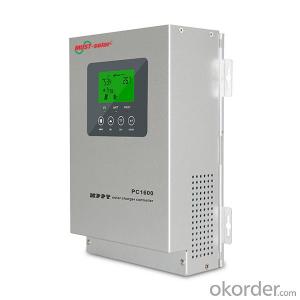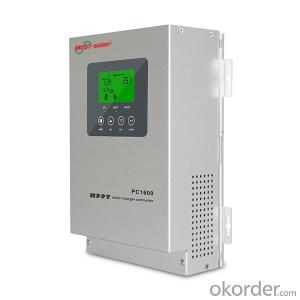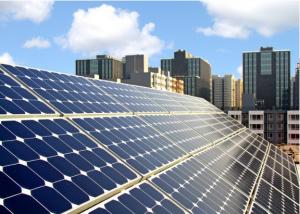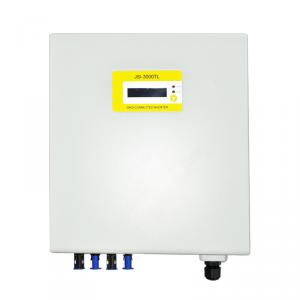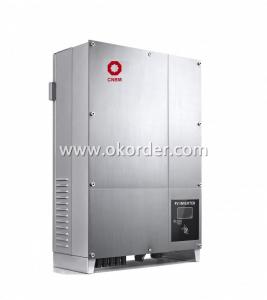Grid Tied Solar Inverter 3000W
- Loading Port:
- Shenzhen
- Payment Terms:
- TT
- Min Order Qty:
- 1 pc
- Supply Capability:
- 1-3000/month pc/month
OKorder Service Pledge
OKorder Financial Service
You Might Also Like
Short introduction of Grid Connected Solar Inverter 3000W
Maximum efficiency of 97.5% and wide input voltage range
Integrated DC switch-disconnected
MTL-String
Sound control
Bluetooth/RF technology /Wi-Fi
Transformerless GT topology
5 years warranty (10 years as optional)
Company introduction:
CNBM International Corporation (CNBM International) is the most important trading platform of CNBM Group Corporation, a state-owned company under the direct supervision of State-owned Assets Supervision and Administration Commission of the State Council.
With a R&D team more than 100 engineers,40% of the staff, who has been deeply engaged in the photovoltaic industry for 10 years, CNBM takes the mission to increase the inverter availability and efficiency, putting continuous innovation to make CNBM inverter easier for installation and operation, and more cost-effective for solar plant construction. The full range of CNBM single phase inverters has received VDE, CE, G83/1, G59/2, ENEL2010, VDE4105, C10/C11, AS4777 etc.
Maximum efficiency of 97.8% and wide input voltage range, Internal DCswitch,MTL-String, Sound control,Bluetooth/RF technology /Wi-FiTransformerless,GT topology
The Grid Connected Solar Inverter we can offer is 1.5kw to 20kw.
Datasheet of Grid Connected Solar Inverter 3000W
Model | CNBM-1500-US | CNBM-2000-US | CNBM-3000-US |
Input data |
| ||
Max. DC power | 1800W | 2300W | 3200W |
Max. DC voltage | 450V | 500V | 500V |
Start voltage | 150V | 150V | 150V |
PV voltage range | 100V-450V | 100V-500V | 100V-500V |
Number of MPP trackers/strings per MPP tracker | 1/1 | 1/2 | 1/2 |
Max. input current of the MPP tracker | 12A | 14A | 17A |
Output data |
| ||
Nominal AC output power | 1500W@208Vac 1650W@240&277Vac | 1800W@208Vac 2000W@240&277Vac | 2500W@208Vac 2800W@240&277Vac |
Max. output current | 8A/7.8A/6.8A | 9.7A/9.4A/8.2A | 15A/14.2A/12.3A |
AC nominal voltage; range | Default:240V single phase optional:208,240or277 single phase 183-228@208V 211-264V@240V 244-305@277V | ||
AC grid frequency; range | 60Hz;59.3-60.5Hz | 60Hz;59.3-60.5Hz | 60Hz;59.3-60.5Hz |
Phase shift (cosφ) | 1 | 1 | 1 |
THDI | <3% | <3% | <3% |
AC connection | Single phase | Single phase | Single phase |
Efficiency |
| ||
Max. efficiency | 97% | 97% | 97% |
CEC efficiency | 96% | 96.50% | 96.50% |
MPPT efficiency | 99.50% | 99.50% | 99.50% |
Protection devices |
| ||
Output overvoltage protection-varistor | yes | yes | yes |
Ground fault monitoring | yes | yes | yes |
Grid monitoring | yes | yes | yes |
General Data |
| ||
Dimensions (W / H / D) in mm | 360/465/165 | 360/465/165 | 360/465/165 |
Weight | 14.6KG | 15.1KG | 15.9KG |
Operating temperature range | -25...+60°C | -25...+60°C | -25...+60°C |
Altitude | Up to 2000m(6560ft) without power derating | ||
Consumption: operating(standby) / night | <5W / < 0.5 W | <5W / < 0.5 W | <5 W / < 0.5 W |
Topology | Transformerless | ||
Cooling concept | Natural | Natural | Natural |
Enclosure | Type 3R | Type 3R | Type 3R |
Features |
| ||
DC connection: | Screw terminal | Screw terminal | Screw terminal |
AC connection: | Screw terminal | Screw terminal | Screw terminal |
display | LCD | LCD | LCD |
Interfaces: RS485/RS232/Bluetooth/RF/Zigbee | yes/yes/opt/opt/opt | ||
Warranty: 5 years/ 10 years / 15 years | yes /opt | yes /opt | yes /opt |
Certificates and approvals | UL1741,UL1998 IEEE 1547, CSA C22.2 No.107.1-1,FCC Part15(Class A&B) | ||
Picture 1 Factory of Grid Connected Solar Inverter 3000W
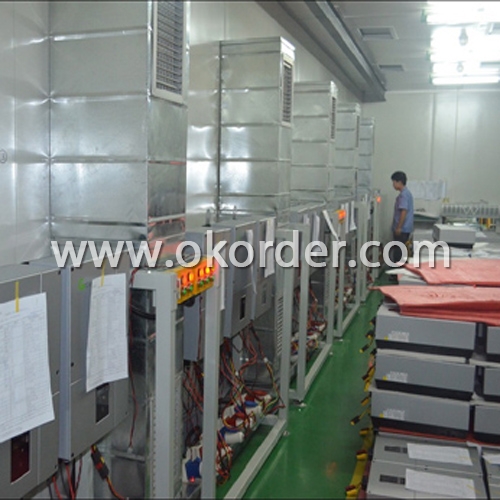
Picture 2 Package of Grid Connected Solar Inverter 3000W
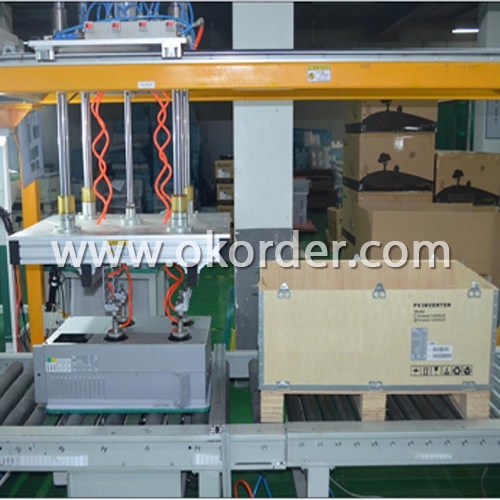
- Q: Can a solar inverter be used with different types of electrical appliances?
- Yes, a solar inverter can be used with different types of electrical appliances as long as the appliances are compatible with the inverter's power output. The inverter converts the direct current (DC) generated by the solar panels into alternating current (AC), which can be used to power various electrical devices. However, it is important to ensure that the inverter's capacity and voltage output are suitable for the specific appliances to avoid damage or malfunction.
- Q: Can a solar inverter be used in a three-phase power system?
- Yes, a solar inverter can be used in a three-phase power system. In fact, three-phase solar inverters are commonly used in commercial and industrial applications where three-phase power is utilized. These inverters convert the DC power generated by solar panels into AC power that can be seamlessly integrated into the three-phase power grid.
- Q: How does a solar inverter handle voltage dips or fluctuations in the grid?
- A solar inverter handles voltage dips or fluctuations in the grid by constantly monitoring the grid voltage. When it detects a dip or fluctuation, it rapidly adjusts its output voltage to stabilize the grid voltage. This process is known as grid support or grid-tied operation and ensures that the solar inverter maintains a steady and synchronized connection with the grid, even during voltage disturbances.
- Q: What is the difference between an on-grid and off-grid solar inverter?
- An on-grid solar inverter is designed to convert the DC power produced by solar panels into AC power that can be fed directly into the electrical grid. It synchronizes with the grid and adjusts the power output accordingly. In contrast, an off-grid solar inverter is used in standalone solar power systems that are not connected to the grid. It stores excess power in batteries and converts DC power to AC power for use in the off-grid system.
- Q: What is the role of a solar inverter in optimizing energy production?
- The role of a solar inverter in optimizing energy production is to convert the direct current (DC) electricity generated by the solar panels into alternating current (AC) electricity that can be used to power homes and businesses. It also helps in managing and controlling the flow of electricity from the solar panels to the grid or batteries, ensuring maximum efficiency and utilization of the generated energy. Additionally, solar inverters monitor the performance of the solar system, providing vital data and feedback to optimize energy production and identify any issues or maintenance requirements.
- Q: How does a solar inverter interact with a battery storage system?
- A solar inverter interacts with a battery storage system by converting the direct current (DC) electricity produced by solar panels into alternating current (AC) electricity, which is then used to charge the batteries. The inverter also ensures that the power from the batteries can be used to supply electricity to the loads when there is no sunlight or during a power outage. Additionally, the inverter manages the flow of electricity between the solar panels, battery, and the electrical grid, optimizing the system's overall efficiency.
- Q: What are the key factors affecting the lifespan of a solar inverter?
- The key factors affecting the lifespan of a solar inverter include the quality and durability of its components, proper maintenance and regular servicing, the operating environment, the load capacity, and the level of electrical stress it experiences.
- Q: How do you choose the right brand of solar inverter?
- Choosing the right brand of solar inverter involves considering factors such as reliability, efficiency, warranty, compatibility with your solar system, and customer reviews. Researching and comparing different brands, their track record, and customer feedback can help in making an informed decision. Additionally, consulting with solar professionals or seeking recommendations from reputable sources can further aid in selecting the most suitable brand for your specific needs and budget.
- Q: Can a solar inverter be used with electric vehicles?
- No, a solar inverter cannot directly be used with electric vehicles. Solar inverters are designed to convert DC (direct current) from solar panels into AC (alternating current) for home or grid use. Electric vehicles, on the other hand, require DC power to charge their batteries. However, solar energy generated through a solar inverter can be used to charge the batteries of an electric vehicle indirectly by connecting the solar system to the power grid or using a separate charging station equipped with a suitable DC charger.
- Q: Are there any voltage or frequency regulations for solar inverters?
- Yes, there are voltage and frequency regulations for solar inverters. These regulations vary from country to country and are typically set by regulatory bodies or standardization organizations. In most countries, solar inverters must comply with specific voltage and frequency limits to ensure the safe and reliable operation of the electrical grid. Voltage regulations specify the allowable range of output voltage that a solar inverter can provide to the grid. This ensures that the voltage remains within acceptable limits to prevent overvoltage or undervoltage conditions that could damage electrical equipment or disrupt the grid's stability. The specific voltage limits depend on factors such as the type of grid system (e.g., single-phase or three-phase) and the voltage levels used in the country. Frequency regulations, on the other hand, define the acceptable range of output frequency that a solar inverter can provide to the grid. Grid frequency is typically set at a specific value (e.g., 50 Hz or 60 Hz) and solar inverters must synchronize their output frequency with the grid to ensure compatibility. Deviations from the specified frequency can lead to issues such as equipment malfunction or instability in the grid. Compliance with voltage and frequency regulations is crucial for solar inverters to ensure the proper integration of renewable energy sources into the electrical grid. In many countries, solar inverters must adhere to specific technical standards or certifications to demonstrate their compliance with these regulations. These standards often cover various aspects of inverter performance, including voltage and frequency control, power quality, and grid interaction.
Send your message to us
Grid Tied Solar Inverter 3000W
- Loading Port:
- Shenzhen
- Payment Terms:
- TT
- Min Order Qty:
- 1 pc
- Supply Capability:
- 1-3000/month pc/month
OKorder Service Pledge
OKorder Financial Service
Similar products
Hot products
Hot Searches
Related keywords

